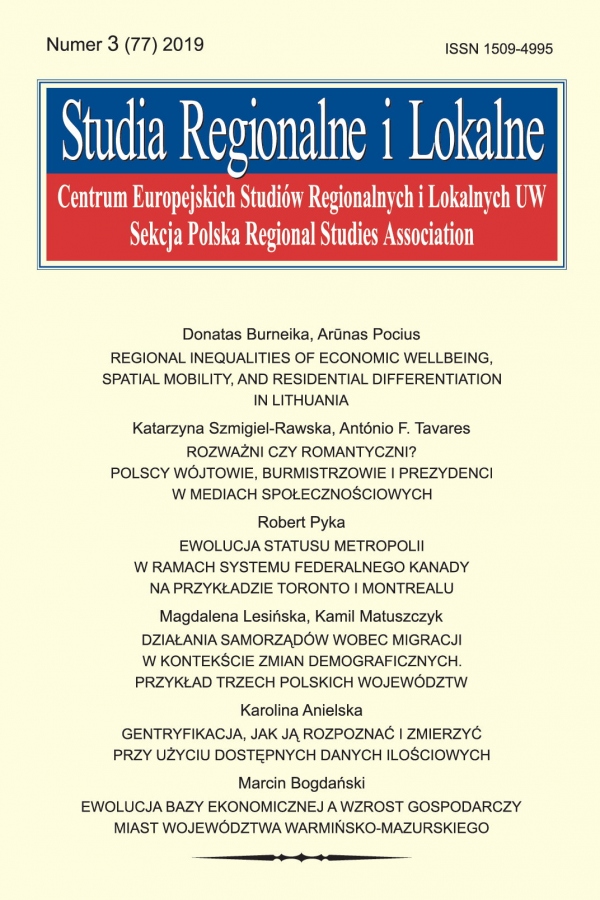Issue:
3(77)/2019
Robert Pyka
The evolution of the metropolis status within the Canadian federal system on the example of Toronto and Montreal
DOI: 10.7366/1509499537703
Ewolucja statusu metropolii w ramach systemu federalnego Kanady na przykładzie Toronto i Montrealu
Autor podejmuje kwestię reorganizacji terytorialnej obszarów metropolitalnych w warunkach kanadyjskiego federalizmu na przykładzie Toronto i Montrealu. Wyniki badań autora wskazują, że realizowane strategie adaptacyjne państw zmierzające do upodmiotowienia metropolii są uzależnione m.in. od generalnej autonomii samorządu terytorialnego w danym systemie politycznym. Funkcjonowanie silnego samorządu terytorialnego może sprzyjać tworzeniu jednostek współpracy międzygminnej przy zachowaniu szczebla lokalnego. Reorganizacja terytorialna obszarów miejskich w państwach o niskim poziomie samodzielności samorządu lokalnego może natomiast spowodować likwidację dotychczasowych jednostek samorządowych przez łączenie ich w nowe samorządy o szerszym, „metropolitalnym” zasięgu terytorialnym (amalgamation). Kanada jest w tym kontekście bardzo ciekawym obiektem badań. Z uwagi na jej ewolucyjny federalizm, ograniczoną samodzielność szczebla lokalnego, w tym miast, oraz krzyżowanie się tradycji europejskich i amerykańskich można tam odnaleźć niemal wszystkie wspomniane wyżej wymiary reform i strategie adaptacyjne. Rozwijana w przypadku Toronto i Montrealu zaawansowana współpraca międzygminna sięgająca połowy XX w. została poddana rewizji przez fuzję współpracujących gmin w nowe, poszerzone terytorialnie metropolie Toronto w 1998 r. i Montrealu w 2002 r., co w obu wypadkach spotkało się z silnym sprzeciwem części mieszkańców i wywołało destabilizację współpracy w obszarze metropolitalnym. Trudne doświadczenia związane z procesem fuzji jednostek samorządowych spowodowały i w Toronto, i w Montrealu rezygnację z dalszych reform strukturalno-terytorialnych na rzecz reform funkcjonalnych, przybierających postać umów na linii prowincja – metropolie, mających na celu poszerzenie autonomii finansowej i kompetencyjnej tych ostatnich. Opisywane trudności w poszukiwaniu właściwego reżimu metropolitalnego i optymalnego ulokowania metropolii w strukturze systemu politycznego i terytorialnego państwa w przypadku analizowanych miast kanadyjskich idą w parze z osiąganymi przez nie pozytywnymi efektami gospodarczymi oraz wysoką jakością życia.
The evolution of the metropolis status within the Canadian federal system on the example of Toronto and Montreal
The author explores the problem of territorial reorganization of the metropolitan area within the Canadian evolutionary federal system, taking as an example the cities of Toronto and Montreal. The results of the research indicate that adaptation strategies, applied by states aiming at empowering the metropolis, depend on the general level of the territorial units’ autonomy. The existence of strong local self-government favours creation of intercommunal cooperation structures without dissolution of current local territorial units. Territorial reorganization in the case of states with a low level of local autonomy may facilitate elimination of former local units by theirs amalgamation in new, larger metropolitan self-government structures. As far as this context is concerned, Canada constitutes a very interesting study case. Taking into consideration Canadian evolutionary federal system, highly limited local autonomy of the cities, and its mix of European and American traditions, one can observe almost all the above-mentioned dimensions of reform and adaptation strategies. Advanced and institutionalized intercommunal cooperation, developed in Toronto and Montreal in the middle of the 20th century, was interrupted by amalgamation imposed by provincial government, which resulted in creation of new, enlarged metropolitan cities of Toronto in 1998 and Montreal in 2002. In both cases the amalgamation has not been accepted by a part of the population and destabilized cooperation in these metropolitan areas. The trouble with amalgamation led to abandonment of further structural and territorial reforms, which were replaced by functional ones, taking the form of special agreements between Toronto and Montreal and their respective provinces (Ontario and Quebec), giving them both new competences and financial resources. Regardless of any difficulties in pursuing an appropriate metropolitan regime and the suitable position for the metropolis in the structure of a political and territorial system, both cities have achieved strong economic performance and high quality of life.
Affiliation:
Robert Pyka: Uniwersytet Śląski w Katowicach, Instytut Socjologii, ul. Bankowa 12, 40-007 Katowice; ORCID: 0000-0001-6690-9207;
robert.pyka@us.edu.pl 


